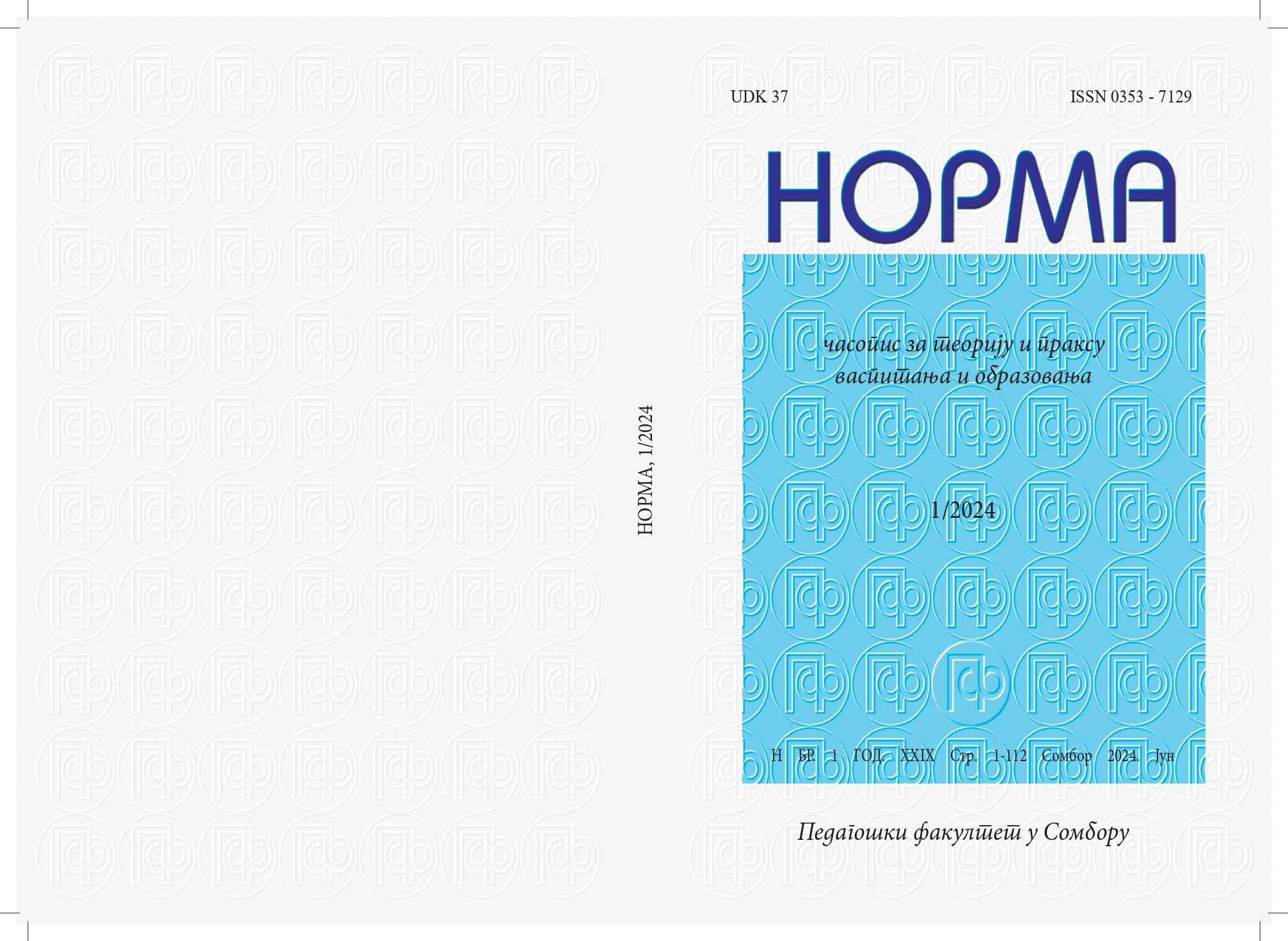ATTITUDES OF FUTURE PRESCHOOL TEACHERS TOWARDS THE IMPORTANCE OF MUSIC EDUCATION FOR PRESCHOOL CHILDREN
Abstract
The paper deals with the presentation of the attitudes of students of the Preschool Teachers Training College in Novi Sad regarding the importance of musical education for preschool children, and the examination of potential correlates of those attitudes in the form of previous musical education or experience, the family's cultural and pedagogical climate and sociodemographic factors. The research approach as well as the results are presented in two parts. The first part of the research was conducted on a sample of 225 second- and third-year students of the Preschool Teachers Training College in Novi Sad. The research was conducted using a non-experimental type method, surveying and scaling techniques, with instruments specially constructed for the needs of this research. The results of the research show that students express very positive attitudes towards the importance of music education for children of preschool age, but that there are differences between the level of positivity of the attitudes of students in the second and third year of study. The second part of the research is a qualitative research, which aims to examine the causes of the difference in attitudes between second and third year students, the change in interest in music and music-performance subjects during the course of study, as well as to what extent the syllabus of music-performance subjects has been changed and supplemented influenced the mentioned differences. One of the goals of the research was to examine the role of teachers in the formation and further affirmation of students' attitudes towards the importance of music education. The research was conducted on a sample of 50 students, and it was done using the technique of surveying and content analysis. Content analysis showed that the majority of students perceive the changes in the syllabus positively due to the increase in professional competences and feelings of personal satisfaction and self-achievement. Also, most students see the teacher as a key figure in realizing and improving their own musical potential. The obtained results open up a space for designing a program to increase the musical and performance competencies of preschool students, so that in the future they could provide adequate musical stimulation to children in preschool institutions.
References
Bačlija Sušić, B., Miletić, A. (2019). Značenje glazbenih aktivnosti za djetetov razvoj iz perspektive studenata ranog predškolskog odgoja i obrazovanja u Hrvatskoj, Srbiji i Sloveniji. U: Svalina, V. (ured.), Zbornik radova sa šestog međunarodnog simpozija glazbenih pedagoga „Glazbena pedagogija u svjetlu sadašnjih i budućih promjena“, 6, 200–214.
Bogunović B., Polovina N. (2007). Obrazovno-materijalni kontekst porodice i odnos učenika prema školovanju. Pristupljeno: 30.07.2007.
Denac, O. (2008). A case study of preschool children's musical interests at home and at school. Early childhood education journal, 439–444.
Despić, D. (2013). Muzička umjetnost. Podgorica: Muzički centar Crne Gore.
Đorđević, J. (2002). Svojstva nastavnika i procenjivanje njegovog rada. Vršac: Viša škola za ovrazovanje vaspitača.
Đuragić, N. (2017). Muzičke preferencije budućih vaspitača. U: Marinković, L. (ured.), Zbornik radova sa interdisciplinarne naučno-stručne konferencije sa međunarodnim učešćem „Svakodnevni život deteta“, 269–279.
Đuragić, N., Šimoković, K., Mihić, V. (2017). Povezanost muzičkog obrazovanja i iskustva sa porodičnom kulturno-pedagoškom klimom budućih vaspitača. Pedagoška stvarnost, 2, 145–160.
Đuragić, N. (2018). Aspekti menjanja i unapređenja muzičkog obrazovanja budućih vaspitača. Inovacije u nastavi, 32 (1), 148–166.
Živković, V. (2021). Slušanje muzike u kontekstu razvijanja i podsticanja kreativnog mišljenja kod učenika viših razreda osnovne škole. Norma, 26 (2), 205-223.
Ilić, M. (2022). Značaj muzičko-pedagoškog rada Zorislave M. Vasiljević za nastavu muzičke kulture u mlađim razredima onsovne škole. Norma, 27 (1), 69-83.
Jeremić, B., Stanković, E. (2019). Metodika nastave muzičke kulture za predškolski i mlađi školski uzrast. Sombor: Pedagoški fakultet.
Hallam, S. (2006). Music Psychology in Education, London: Institute of Education, University of London.
Leman, A., Sloboda, Dž., Vudi, R. (2012). Psihologija za muzičare, Novi Sad: Psihopolis institut, Beograd: Fakultet muzičke umetnosti.
Levitin, D. (2011). Muzika i mozak. Novi Sad: Psihopolis.
Matić, E., Mirković-Radoš, K. (1986). Muzika i predškolsko dete. Beograd: Zavod za udžbenike i nastavna sredstva.
Meyer, H. (2002). Didaktika razredne kvake. Zagreb: Educa.
Munćan, S. (2023). Autonomija učenika kao cilj vaspitanja i obrazovanja. Norma, 28 (2), 181-195.
Nikolić, L. (2015). Faktori sticanja i razvoja muzičkih kompetencija kod studenata učiteljskih studija (doktorska disertacija). Beograd: Fakultet muzičke umetnosti.
Peery J., C. & Perry W., I. (1986). Effects of Exposure to Classical Music on the Musical Preferences os Preschool Children. Jorunal of Research in Music Education, 34 (1), 24–33.
Plavša, D. (1961). Moje dete i muzika. Beograd: Narodna knjiga.
Radoš, K. (2010). Psihologija muzike. Beograd: Zavod za udžbenike.
Reilly, M. L. (1969). Preschool teachers need music. Music Educators Journal, 55 (8). 40–42.
Scott-Kassner, C. (1999). Developing Teachers for Early Childhood Programs. Special focus: Music and Early Childhood. Music Educators Journal, 86, (1), 19–25.
Tomčić, L. (2021). Značaj uvažavanja stilova učenja u nastavnom procesu – primer Kolbovog modela iskustvenog učenja. Norma, 26 (1), 67-79.
Vasiljević, Z. (2000). Rat za srpsku muzičku pismenost – Od Milovuka do Mo¬kranjca. Beograd: Prosveta.
Vasiljević, Z. (2006). Мetodika muzičke pismenosti: udžbenik za studente Univerziteta umetnosti i Učiteljskog fakulteta. Beograd: Zavod za udžbenike.
Copyright (c) 2024 Norma

This work is licensed under a Creative Commons Attribution 4.0 International License.

